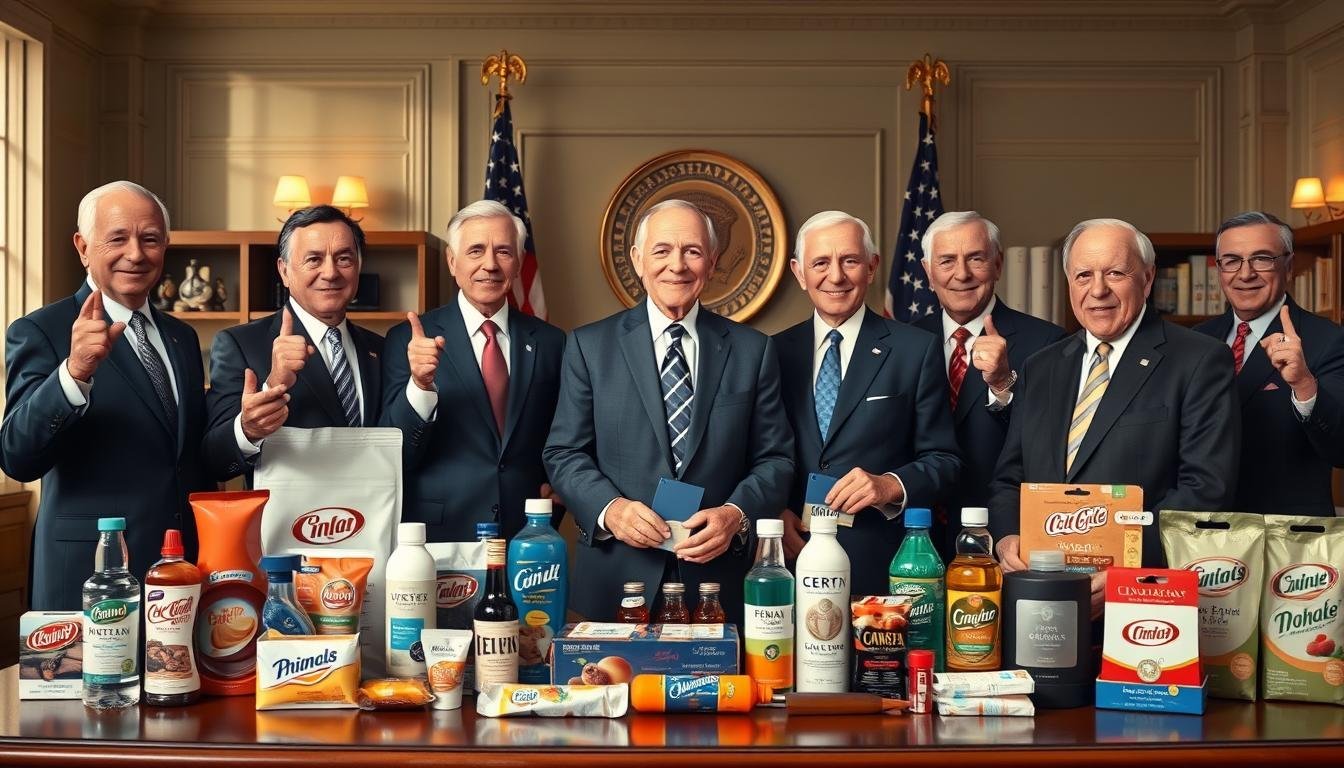Are US Presidents Allowed to Endorse Products? Have you ever thought about if US Presidents can endorse commercial products? The answer is not simple. It involves a mix of laws and ethics.
As a citizen, you might be curious about the rules on presidential endorsements. Whether it’s legal is a big debate. Some say it’s free speech, while others worry about conflicts of interest.
The laws on what Presidents can do are complex. Product endorsements fall into this category. Knowing the details helps us understand the bigger picture.
Contents
- 1 Legal Framework Governing Presidential Endorsements
- 2 Key Regulations and Laws
- 3 Are Presidents Allowed to Endorse Products While in Office?
- 4 Historical Examples of Presidential Product Associations
- 5 Consequences of Improper Presidential Endorsements
- 6 Ethical Considerations Beyond Legality
- 7 Conclusion: Are US Presidents Allowed to Endorse Products?
- 8 FAQ
- 8.1 Are US Presidents allowed to endorse commercial products while in office?
- 8.2 What laws govern presidential endorsements?
- 8.3 Can former US Presidents endorse products after leaving office?
- 8.4 What are the consequences of improper presidential endorsements?
- 8.5 How do social media endorsements factor into presidential product associations?
- 8.6 What ethical considerations should US Presidents keep in mind when considering product endorsements?
Legal Framework Governing Presidential Endorsements
To understand the rules of presidential endorsements, you need to look at the legal framework. The legality of these endorsements is complex. It’s shaped by many laws and regulations.
The main laws are the Ethics in Government Act of 1978 and the Standards of Conduct from the Office of Government Ethics. These rules aim to stop conflicts of interest. They make sure government officials, like the President, don’t benefit personally from their position.
Key Regulations and Laws
Many regulations and laws affect presidential endorsements. Knowing these is key to understanding what’s allowed.
| Law/Regulation | Purpose | Impact on Presidential Endorsements |
|---|---|---|
| Ethics in Government Act of 1978 | To regulate the conduct of government officials | Limits the President’s ability to endorse products that could help their finances. |
| Standards of Conduct | To prevent conflicts of interest | Forbids using public office for personal benefit, including endorsements. |
| Federal Election Campaign Act (FECA) | To regulate campaign finance | Affects how endorsements are used in campaign ads. |
These laws do limit some actions, but they also set a path for the President to follow. The President can do official duties or public service. But, they can’t endorse products for personal gain.
The laws on presidential endorsements aim to keep the office’s integrity. They stop the President from using their power for personal benefit. So, any endorsement must be checked against these rules.
Grasping these laws’ details helps see why some endorsements are okay and others aren’t. It’s a complex field that needs careful handling to follow the rules.
Are Presidents Allowed to Endorse Products While in Office?
Whether presidents can endorse products while in office is a complex issue. It involves legal and ethical considerations. As the nation’s figurehead, their endorsements can sway public opinion.
The Ethics in Government Act of 1978 outlines what government officials, including the president, can do. It aims to stop the misuse of public office for personal gain. For example, it bars the president from promoting products that could financially benefit them.
Ethically, the issue is complex. The president’s endorsement can be seen as government approval, affecting consumer choices. This raises fairness and integrity questions. It’s important to ask if it’s right for a president to endorse products, especially unrelated to their duties.
Considering the consequences of presidential endorsements is crucial. These can include legal issues and societal impacts on consumer behavior. Thus, any talk about endorsements must weigh these factors carefully.
When looking at the ethics of endorsements, think about undue influence and mixing public duty with personal interest. The goal is for the president’s actions to be transparent, follow laws, and not use their position for personal gain.
Historical Examples of Presidential Product Associations
Many U.S. presidents have endorsed commercial products. This has sometimes mixed public service with private business.
Theodore Roosevelt loved outdoor gear and was used to promote products. Ronald Reagan, a former actor, appeared in ads before and after his presidency. His charm was used by brands, even when he was president.
John F. Kennedy’s family was tied to business ventures. Though he didn’t directly endorse products, the Kennedy name has been used in marketing. This has helped businesses benefit from his legacy.
Social media has changed how presidents endorse products. Sitting presidents can’t directly endorse due to rules. But they share their likes and support for causes on social media.
Barack Obama and Michelle Obama started “Let’s Move!” on social media. It aimed to fight childhood obesity by promoting healthy eating and exercise. This shows how social media can shape consumer choices and promote lifestyles or products.
Donald Trump used Twitter (now X) to share his views on products and services. His tweets were personal, not official endorsements. Yet, they drew a lot of attention and shaped public opinion.
Consequences of Improper Presidential Endorsements
US Presidents endorsing products the wrong way can lead to big problems. It can hurt their legal status and how people see them. If a President endorses something wrong, it breaks the rules.
One big worry is the legal trouble they might face. If a President breaks the endorsement rules, they could get sued. This could mean looking into if the endorsement was corrupt or broke ethics laws.
Also, wrong endorsements can harm a President’s image. Keeping the public’s trust is key for a President’s success. Any wrong move can hurt not just the President but the whole administration.

There are also big ethical issues. Presidents are expected to act with high integrity. Wrong endorsements can be seen as a failure to meet this standard.
To stay clear of these issues, Presidents need to know and follow the endorsement rules. They must understand what is allowed and what isn’t.
Ethical Considerations Beyond Legality
The ethics of presidential endorsements are complex for US Presidents. Their influence can greatly affect public opinion and buying habits. This is a big challenge.
Looking at the ethics of presidential endorsements, we see a big issue. A President’s support can unfairly help some businesses over others. This raises fairness and potential misuse of power questions.
Transparency is key here too. When a President backs a product, it’s not always clear if they benefit from it. This lack of openness can hurt trust in the presidency and confuse the public. It’s important to be open and honest.
The US Presidents product endorsement also affects how people shop. These endorsements can boost sales and sway what people buy. This shows the need for careful thought in what products are endorsed.
- The potential for conflict of interest when endorsing products that may benefit from their influence.
- The impact on consumer behavior and the responsibility that comes with influencing purchasing decisions.
- The need for transparency and clear disclosure in all endorsement activities.
In summary, while laws set limits, ethics are just as important. Thinking about the role of US Presidents in endorsing products shows the need for integrity. This ensures their influence is used wisely.
Conclusion: Are US Presidents Allowed to Endorse Products?
You now know how US Presidents deal with product endorsements. Laws and rules control what they can and can’t do. This is important to understand.
Looking at past examples, we see how tricky it can be. From Franklin D. Roosevelt’s radio talks to Ronald Reagan’s product endorsements, each case shows the complexity. It’s clear we need to know the rules well.
Not following these rules can lead to big problems. There are also moral issues to think about, not just legal ones. The mix of laws and history gives us a full picture of this issue.
By studying past endorsements, we learn about the balance a President must keep. They have personal freedom but also a public duty. Knowing this helps us understand the challenges they face.
See Also: Lincoln’s Assassination and Its Impact on Reconstruction
FAQ
Are US Presidents allowed to endorse commercial products while in office?
No, US Presidents can’t endorse products while in office. Laws and regulations stop them from using their position for personal gain.
What laws govern presidential endorsements?
Laws like the Ethics in Government Act and the Hatch Act control presidential endorsements. They make sure the President doesn’t use their power for personal benefit or to promote products.
Can former US Presidents endorse products after leaving office?
Yes, former Presidents can endorse products after leaving. But they must follow rules and not use their old position to promote products.
What are the consequences of improper presidential endorsements?
Bad endorsements can lead to legal trouble, harm to their reputation, and fines. It depends on the endorsement and the laws broken.
Social media is key in today’s presidential endorsements. It lets Presidents promote products directly. But, they still face the same laws and rules as other endorsements.
What ethical considerations should US Presidents keep in mind when considering product endorsements?
Presidents should think about how their endorsements might be seen by the public. They should avoid conflicts of interest. And make sure their endorsements don’t hurt the integrity of their office or the government.

Hi, I am Tatum Bradford from Washington. I have a background in political science and work as a senior revenue officer. I love learning about U.S. presidents and sharing interesting facts about political history.

